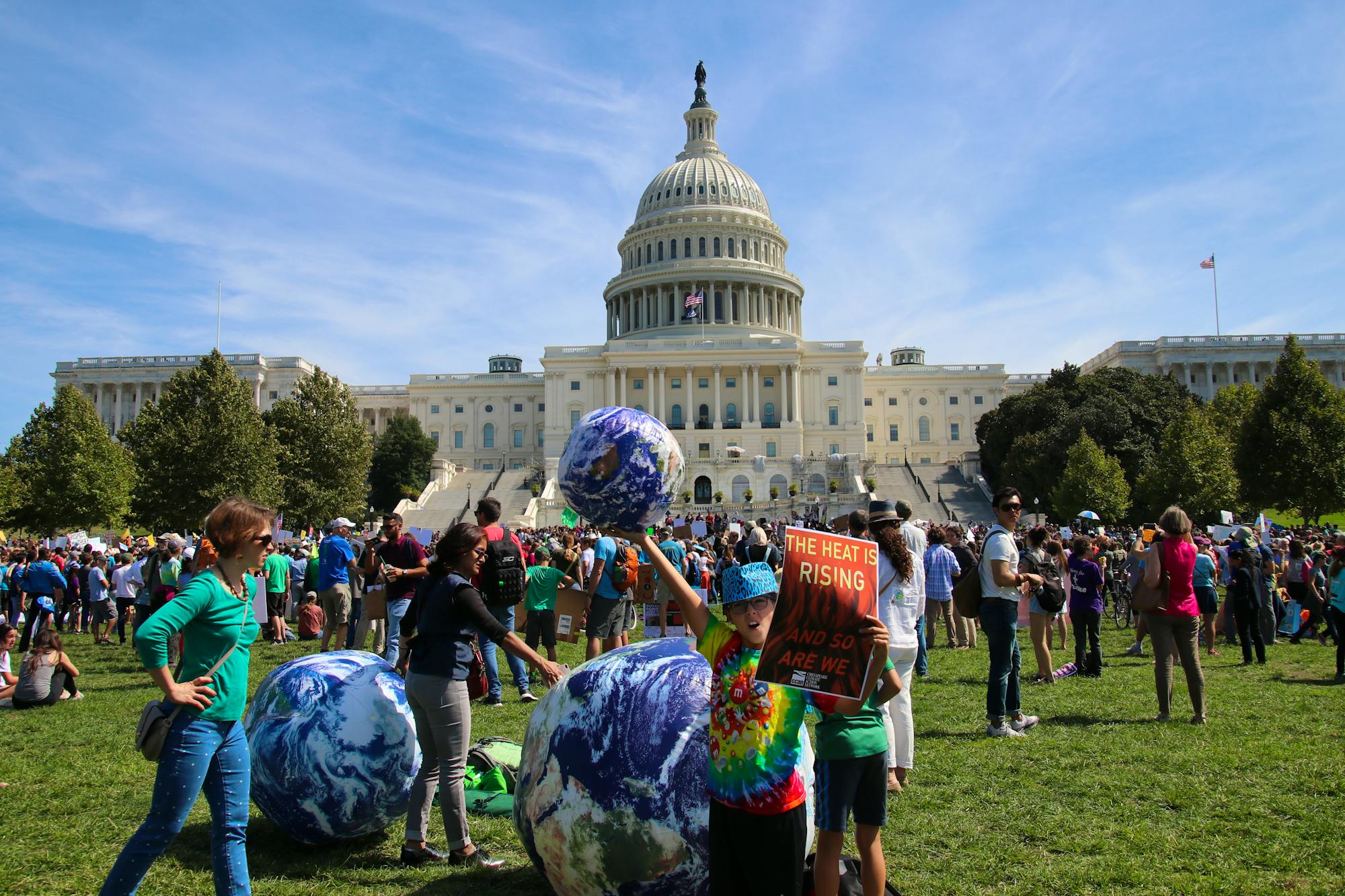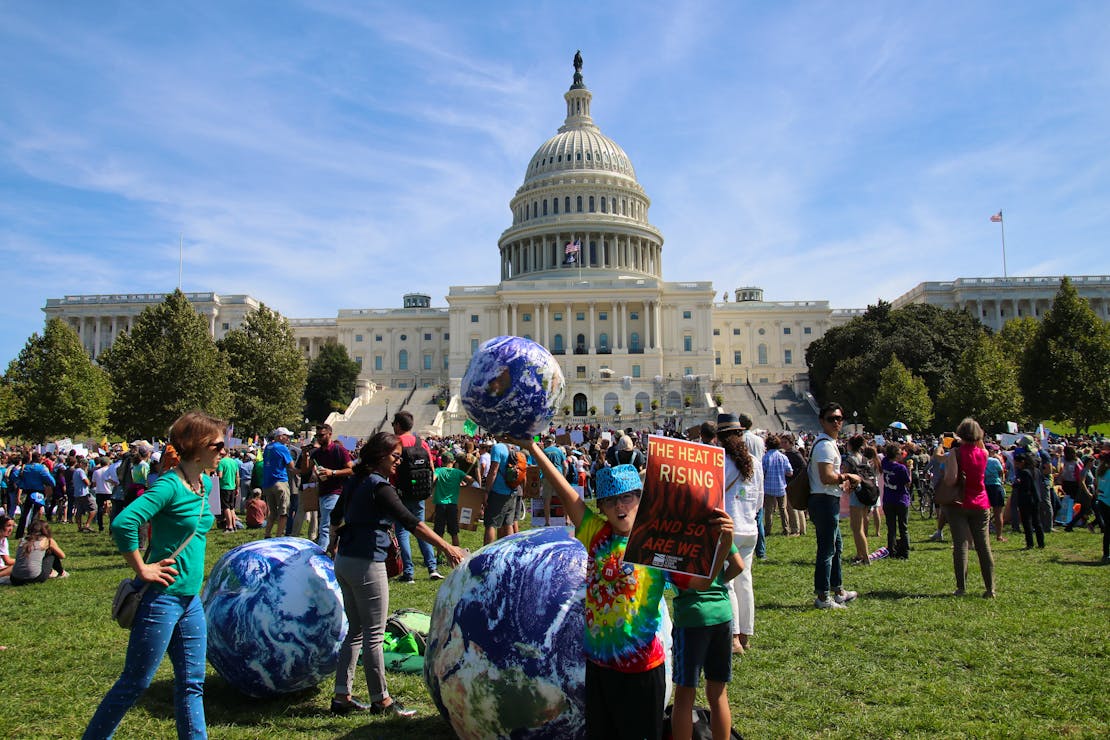The youngest generations see the climate crisis as an existential threat, requiring drastic action. The youth climate movement – a collection of organizations and actions led mostly by young people to bring about action from our leaders to combat climate change – burst on the scene over the past decade. Shutting down city streets and legislative offices, their organized protests are forcing national media and world leaders to pay attention to the disaster unfolding before our eyes.
Globally, species extinction is happening at up to 1,000 times the rates typical in the past, with one in four species—about 1 million—at risk of extinction. According to the IUCN, climate change is already affecting 19% of species on the Red List and in the U.S., 99% of animals on the Endangered Species List are sensitive to climate change. Increasing temperatures affect habitat, the ability to find food, reproductive cycles and more:
- Heat stress and ocean acidification is decimating coral reefs, and a 2℃ increase in global mean temperature will make coral reefs functionally extinct.
- Earlier and diminished snow melt is altering the timing of historical chinook and sockeye salmon runs.
- Warmer sand is causing green sea turtle eggs to hatch with sex ratios wildly out of balance (sometimes 99% female).
The climate crisis is a call to action for people around the world to speak up about these dangers to wildlife and humanity. This new generation of activists has gained attention for leading this fight and speaking out. Although I’m in my 30s, I am inspired by all these younger people who want to make a difference and who have found their voices to speak truth to power. People have a hard time looking past immediate needs, but the climate crisis is requiring everyone to think about what life will be like 50 or 100 years from now. These younger generations will be alive 50 years from now and will bear the brunt of the devastating effects of climate change. The voices of these young, diverse activists should be amplified and celebrated as they bring different perspectives to the challenges and opportunities of the climate crisis.
One of the most well-known activists is Greta Thunberg, TIME Magazine’s 2019 Person of the Year. Thunberg was only eight when she first learned about the climate crisis. As she grew older, she reduced her carbon footprint by refusing to fly and by becoming vegan, and she has influenced her family to do the same. Thunberg’s Asperger syndrome doesn’t allow her to process information in the same way others do, and as a result, she could not compartmentalize the fact that the Earth is in danger. Her passion sparked a youth movement, Fridays for Future, and every Friday she asks students to strike with her and demand concrete action. Global Week for the Future, held September 20-27, 2019, was the largest global climate rally to date. Over 4 million people participated in these worldwide protests, including events scheduled in 163 countries on all seven continents.
Jamie Margolin, another young leader at the forefront of the youth climate movement, had an unusual early awareness of climate change. She is a Colombian-American Jewish Lesbian who grew up watching The Colbert Report and The Daily Show and interned with Hillary Clinton’s 2016 campaign. At age 15, she started Zero Hour because she felt that young people needed to be heard. Zero Hour is not just about striking and rallying, it’s devoted to wielding political influence. It is particularly focused on vulnerable populations because, according to Margolin, the climate crisis is “really an issue of race and socioeconomic injustice because the people who are facing it are those who face racial and socioeconomic disparity every day.”
In addition to protests and strikes, the youth climate movement incited legal action. Kelsey Juliana, a 23-year-old from Eugene, Oregon, is the face of Juliana vs U.S., a lawsuit filed in 2015 when she was just 19 on behalf of children. In fourth grade, Juliana organized her classmates to participate in the first International Day of Climate Activism. At 15, Juliana sued the governor of Oregon to demand a state carbon emissions reduction plan. The lawsuit asserted that the U.S government’s actions cause climate change and, as such, violate the right of young people to expect future life, liberty and other constitutional rights.
The lawsuit claims that the government ignored its responsibility to keep fossil fuel emissions in check, violating the rights of young Americans. The lawsuit also sought to establish a constitutional right to a stable climate. Juliana says, "I believe that climate change is the most pressing issue my generation will ever face, indeed that the world has ever faced. This is an environmental issue and it is also a human rights issue." The federal government, under both the Obama and Trump administrations, has tried many times to block the lawsuit from proceeding and in January 2020, the case was dismissed by the Ninth Circuit Court of Appeals. Pat Parenteau, Law Professor at the University of Vermont, said: "What the court said is, 'We are facing the destruction of the nation by climate change; that the government allowed it to happen, but too bad there's nothing we can do.'"
Even though the case was dismissed (although the plaintiffs plan on appealing this decision), it put climate change on trial and set a precedent for such legal action. At the UN Climate Summit, Greta Thunberg and 15 other young participants sued Argentina, Brazil, France, Germany and Turkey for violating their rights under the UN Convention on the Rights of the Child. The participants include a 17-year-old who had to leave Cape Town because of a lack of running water during a recent drought and a 12-year-old from Lagos, Nigeria, whose asthma has become worse because of heat waves.
Climate change is one of the greatest threats humankind and wildlife have ever faced, but it is still not too late to act. The worlds’ youth realizes—and scientists agree—that drastic and immediate actions is needed. What we do right now will affect humankind and wildlife forever. The young people who will inherit that future have something to say about it. We should listen to them.







